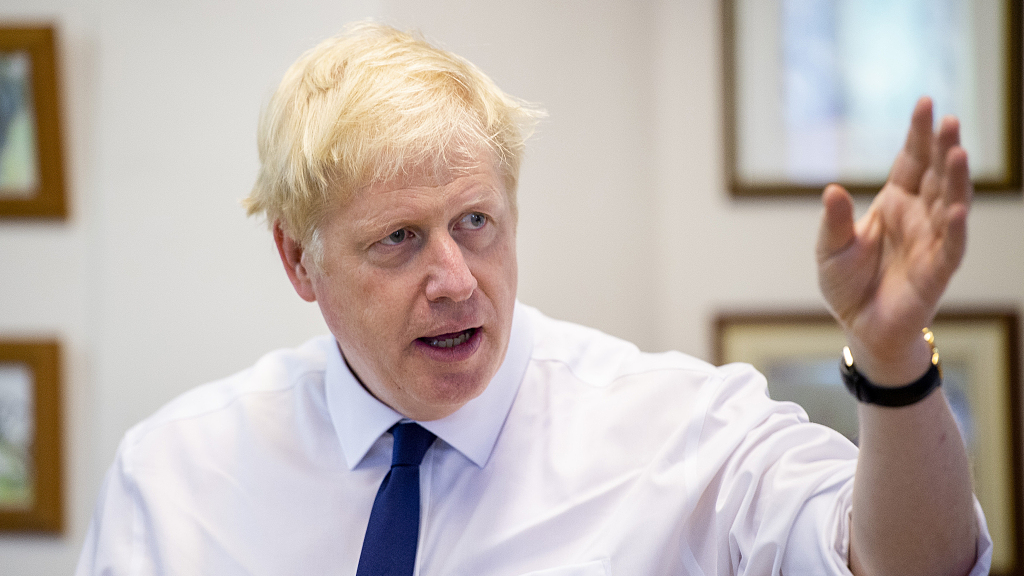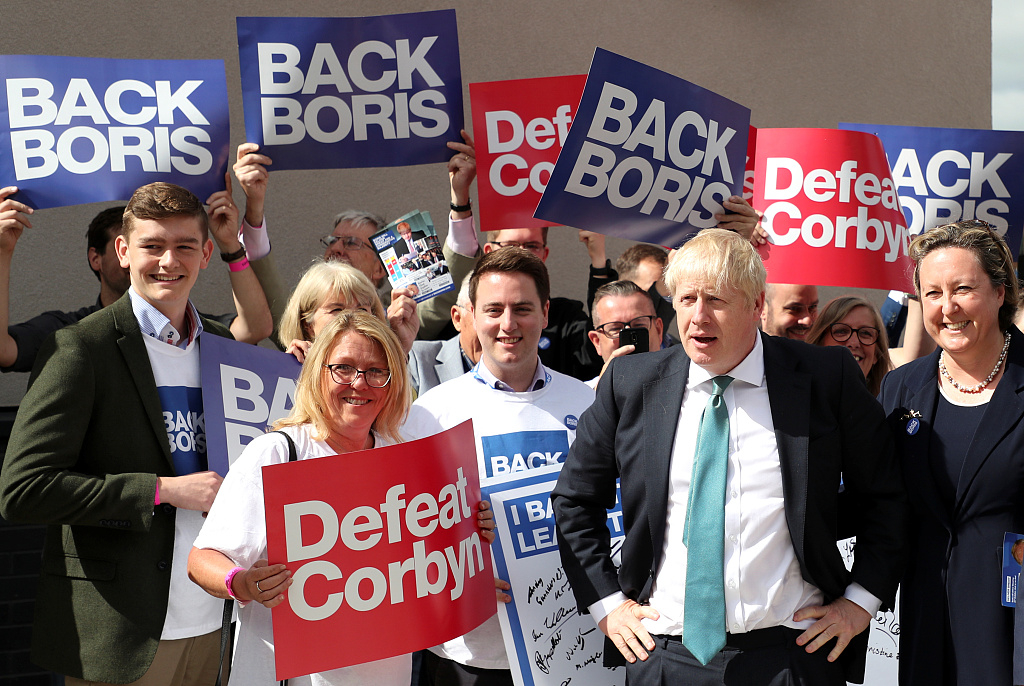

Editor's note: Chris Deacon is a postgraduate researcher in politics and international relations at the University of London and previously worked as an international commercial lawyer. The article reflects the author's opinion, and not necessarily the views of CGTN.
As ballot papers are sent out to members of the UK's governing Conservative Party for the leadership contest that will decide the country's next prime minister, embarrassing revelations emerged on Friday about the clear favorite Boris Johnson.
The BBC learned from sources that, when Theresa May made Johnson her foreign secretary in 2016, she and her team attempted to withhold sensitive intelligence from him. This would have been a somewhat odd move. The UK's foreign secretary is nominally in charge of the country's Secret Intelligence Service (SIS), otherwise known as MI6, as well as GCHQ, which deals with communications intelligence. Access to secret intelligence, therefore, is a crucial part of the job.
It is understood that senior members of the intelligence community had concerns about whether Johnson should be given access to all the information produced by MI6 and its global spy network. This resulted in May's Downing Street team attempting to prevent Johnson from having access to high-level categories of intelligence. Johnson is said to have been aware of this and, understandably, deeply unhappy with the situation in private.

A general view of the Secret Intelligence Service building in Vauxhall, London. /VCG Photo
Although unusual – the move is widely thought to be without precedent – May has a particular reputation for seeking control over a wide spectrum of policy matters, and not allowing her ministers the freedom that others might. But this is a particularly extreme example of such behavior, and is especially perplexing given her decision to award the job to Johnson in the first place, which came as a shock to many at the time.
Particularly problematic is the fact that the foreign secretary must personally authorize certain intelligence operations and, therefore, being denied knowledge of the full situation due to these restrictions would cause immense difficulties in such a decision. Indeed, it is understood that the security services even sought legal advice regarding whether they could continue policy.
It is thought that May's concerns date back to her time as home secretary – the minister in charge of the domestic Security Service, also known as MI5 – when Johnson was the mayor of London. Allegedly on one occasion Johnson publicly revealed confidential information with which he had been provided before he was allowed to do so, angering May in the process.
Clearly there was a fundamental lack of trust between May and Johnson. This of course begs the question even more as to why May would entrust him with the position of foreign secretary at all, but it is also potentially extremely damaging for Johnson during the Conservative leadership campaign as he bids to become prime minister.

Boris Johnson (2nd, right) arrives to attend an event in Darlington, Britain, July 5, 2019. /VCG Photo
Johnson has, as one would expect, denied the veracity of the story, but it appears to be well-sourced and the BBC would be extremely unlikely to proceed with such a hard-hitting story were it not relatively certain of its accuracy.
Nevertheless, Johnson is so far ahead of Jeremy Hunt in the bookmakers' odds to become the next prime minister that one assumes this will not damage his chances enough to lose the contest at this late stage. However, we must also remember that if Johnson does win, he will have to serve as prime minister on the global stage – a stage on which his reputation has already been damaged terribly.
He will also, eventually, need to win a general election if he wishes to keep the job. If the British public come to believe – more than they already do – that Johnson is not a safe pair of hands for the country, then he is unlikely to perform particularly well. And they would be right to worry. Johnson has consistently embarrassed himself both domestically and internationally and if, even as foreign secretary, he was not trusted with the nation's most important intelligence, that is a damning indictment as to his capability to lead the country.
If Johnson does win his party's leadership contest, as most assume he will, and becomes prime minister, he will have a great deal to do to prove to the public that he is up to the job. Whether personal scandals or revelations about his professional incompetence, many will be extremely worried about his suitability. It remains to be seen whether or not he is capable of proving them wrong.
(If you want to contribute and have specific expertise, please contact us at opinions@cgtn.com.)

Copyright © 2018 CGTN. Beijing ICP prepared NO.16065310-3
Copyright © 2018 CGTN. Beijing ICP prepared NO.16065310-3